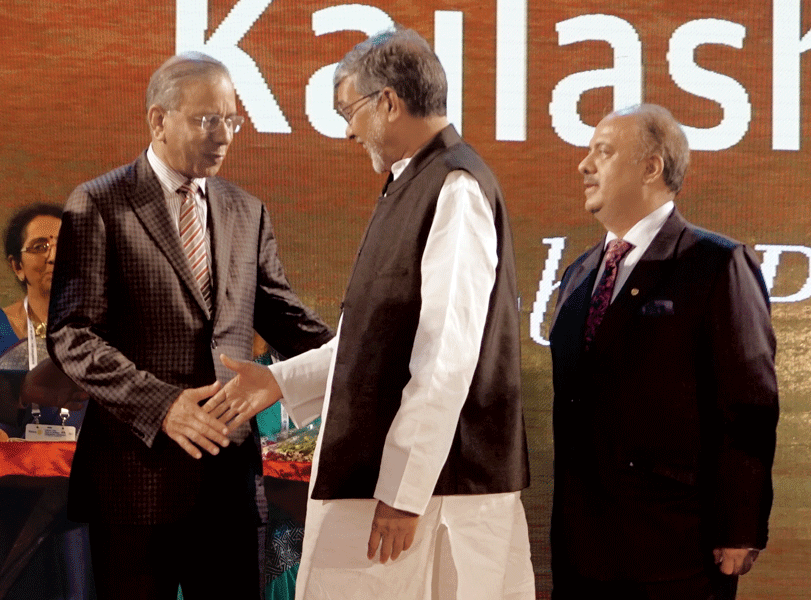The feathers in Nobel Peace Laureate Kailash Satyarthi’s crown are many; the march he organised in 2001 to make education a fundamental right for every child; it got the support of 168 MPs across parties. Or the global march against child labour and child trafficking that he organised and which went across 103 countries, covering 80,000 km with the demand for an international law. “When we reached Geneva and the general assembly of the ILO, no government could withstand the moral demand of children for education. We said ‘No more guns in tiny hands, we want books, pencils, toys.’ Finally, thanks to the humble effort from the soil of India, an international law was passed. Since then the number of child labourers has decreased from 260 million to 168 million in fifteen years. At that time 130 million children were then out of school, now there are less than half — 59 million. It is possible. If you have courage, conviction, commitment, clarity, but more important, if you have compassion for our children, we can do it … it’s not such a big deal. We’ll do it together.”

Satyarthi said the great power of education has been acknowledged by those fundamentalist forces who feel that if the children are educated, they will demolish their evil designs. “As many as 5,000 girls have been snatched away by the ISIS from their parents on the borders of Iraq. How do you feel when you read that a 5, 6 or 7-year-old girl, who was in school, has been sold into sexual slavery by the ISIS at a lesser price than a cigarette pack? Whose daughter is she, if not yours, if not mine.”
And if that girl did not “perform” (sexually), she was buried alive in an earlier prepared grave.
A 10-year-old boy, taken out of a school, is given a gun in his hand to kill the suspected traitors of ISIS. He couldn’t operate the gun, so was buried alive. In Pakistan, 140 children were killed in the Army school … “Whose children were they,” thundered Satyarthi, “yours and mine. These people (Taliban) understand the power of education.” He then related the story of a mother of one such child he visited — he has been working in Pakistan for over thirty years. She told him that
“I hurried my son not to be late for school … I sent him to school in a uniform and got him back in a coffin.” What was his guilt, sin, fault? These Pakistani children are also our own, these Syrian girls are also our own. “We are a nation where for over thousands of years our rishis and munis have been talking of Vasudeva Kudumbam … so this is mine and this is yours is mean mentality.”
For those who are liberal in heart and mind, the whole universe is theirs. “We have to rise above narrow political boundaries for all our children. What happened in Nigeria — 40 girls were kidnapped from school and one doesn’t know their fate, whether they are alive or dead. Kidnapped by those fundamentalist forces who know the power of education.”
The world was facing three serious enemies; the first one was apathy. “We live in a competitive world; the competition in careers, education, personal life, and so on, is narrowing us down, confining us to our own selfish interests and apathetic to our neighbours … it’s a global phenomenon,” he said.
Next comes fear; after 9/11 everything has changed — the economics, geo politics, psychology. “We live in fear or terrorism which is not an isolated but a global problem.

The third one is impatience and intolerance … your own children and youth are not as tolerant or patient as you were. These three enemies have to be fought through education, empowerment, entrepreneurship, which means we have to ensure best quality education for all our children.”
A World Bank report conducted over fifteen years in 50 countries establishes that a single year of schooling for a developing country would give a 0.37 per cent additional return on the GDP. If done over ten years, the return will be 4 per cent higher on the GDP. So the path to sustained economic growth goes through education … quality education. Not through slavery or child labour.
Disclosing a startling statistic, the Nobel Laureate said globally 168 million children are in full-time jobs, whereas 200 million adults are jobless. Why? Because children are the cheapest source of labour. If they get education, they will become empowered young people so it is better to get work out of them in early childhood, seems to be the mantra. “So their childhood is taken away and the adults remain jobless. Studies in India, Peru, Nigeria, Brazil, etc, establish parallels between child labour and poverty. Many people think children are working because of poverty. No child has created poverty in the world, or war or violence.” He added that no child was responsible for the world we are facing now … our planet and its people are in danger, peace is in danger … no child is responsible for it. “We are responsible for poverty, and poverty will never go without the elimination of child labour.”
Again, a World Bank study, done along with agencies such as UNESCO, proves that every single dollar invested in education gives a return of $15 in twenty years. Also, $1 invested in eradication of child labour gives seven times the return in twenty years. So why don’t we prioritise eradication of child labour as an economic imperative for which there are moral imperatives as well, he asked.
Pictures by Rasheeda Bhagat





